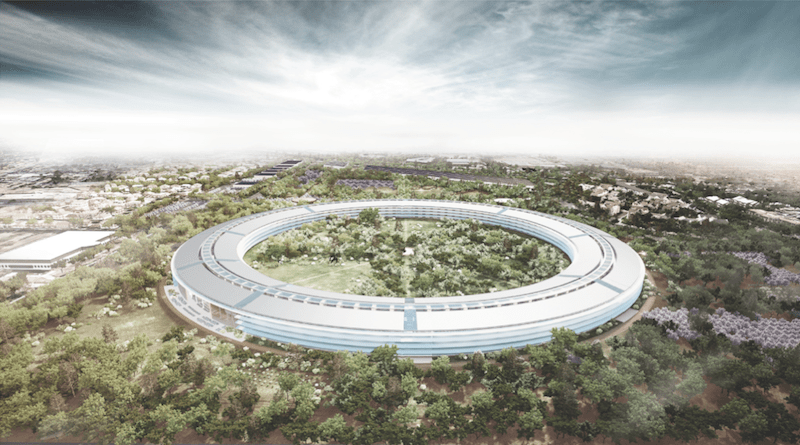Apple revealed its plan to build a large spaceship campus which currently comprises of 80% asphalt, but Apple plans to turn it down to 20% and build the campus as a self energy sufficient green campus. The plans include covering the whole roof top with solar panels, underground parking lots and many other features. Apple is planning to have at least 80% green cover in its new campus which is supposed to be completed by 2016. Following this news reports are coming in that most tech giants are planning to build their own green campuses and give back to mother earth. Plans from Google, Samsung and Facebook reveal many energy efficient features in their future offices.

Parking and transport:
Apple is planning a humongous 2,300 spaces parking lot below its 2.8 million square foot building space for tis employees which will cut down usage of Asphalt in its green campus, it plans to add an additional 5,800 spaces at a parking structure on the southern edge of its property. Meanwhile Facebook seems to be planning an underground its 425,000 square feet office space and build tunnels underground as well to connect its wings.
Greenery:
Apple plans to plant around 6,000 tree on its property to reach the target 80% green lands which will include plantation of oaks, eucalyptus, apricots, pears, apples and what not apart from the general species of trees and grass. Apple has a unique plan to plant 108 trees that will symbolise for properties like age, size or uniqueness by spending a whooping $50,000 to $100,000 on each tree including the relocation costs. Google plans to go for landscaped green roofs for five of its nine existing buildings in San Francisco, this will essentially help in reducing cooling costs and heating costs as well depending on climate outside. Facebook plans to go for a mix of grass and small shrubs that will require laying 4 feet high mud on its buildings.
Special features:
Google is planning to go for a specialised water recycling system in its Mountain View campus. The water filtering system will process and filter out all water including sewage and then later use the water either to sprinkle the lawns or release it back into the San Francisco Bay. Though the proposed recycling system is expensive the tech giant aims to contribute and play a role in giving back to nature.
All the companies plan to further cut down the costs by going for pre-fabricated units on their campuses for essential parts like bathrooms and office spaces with carpets and curtains, this system will cut down costs by an estimated amount of 20%.
Source: Business Week
